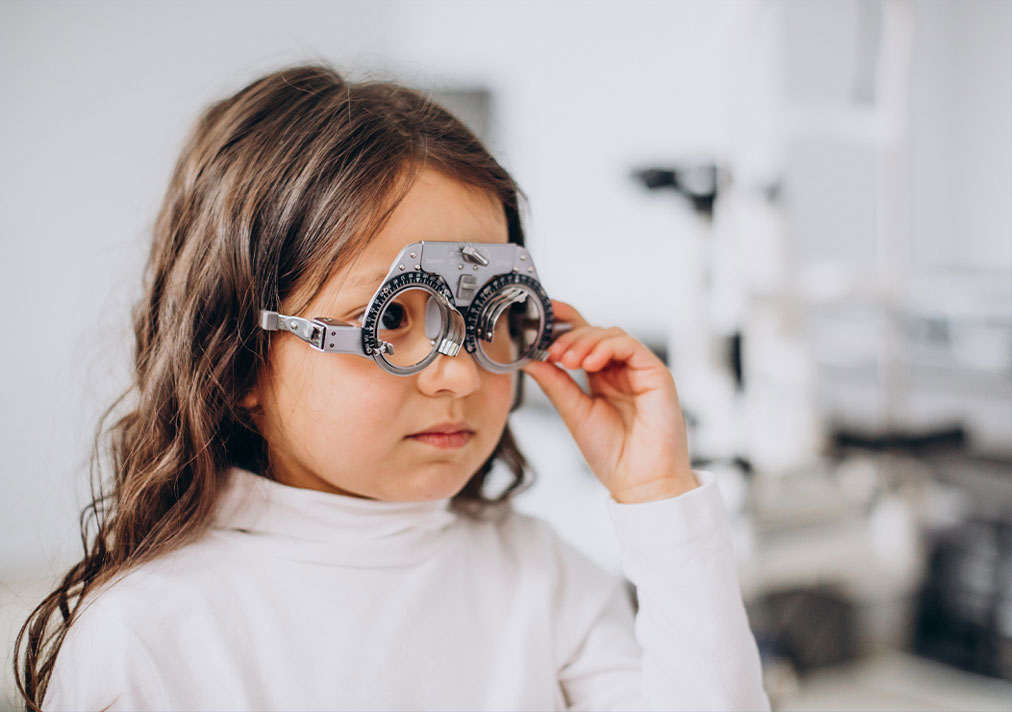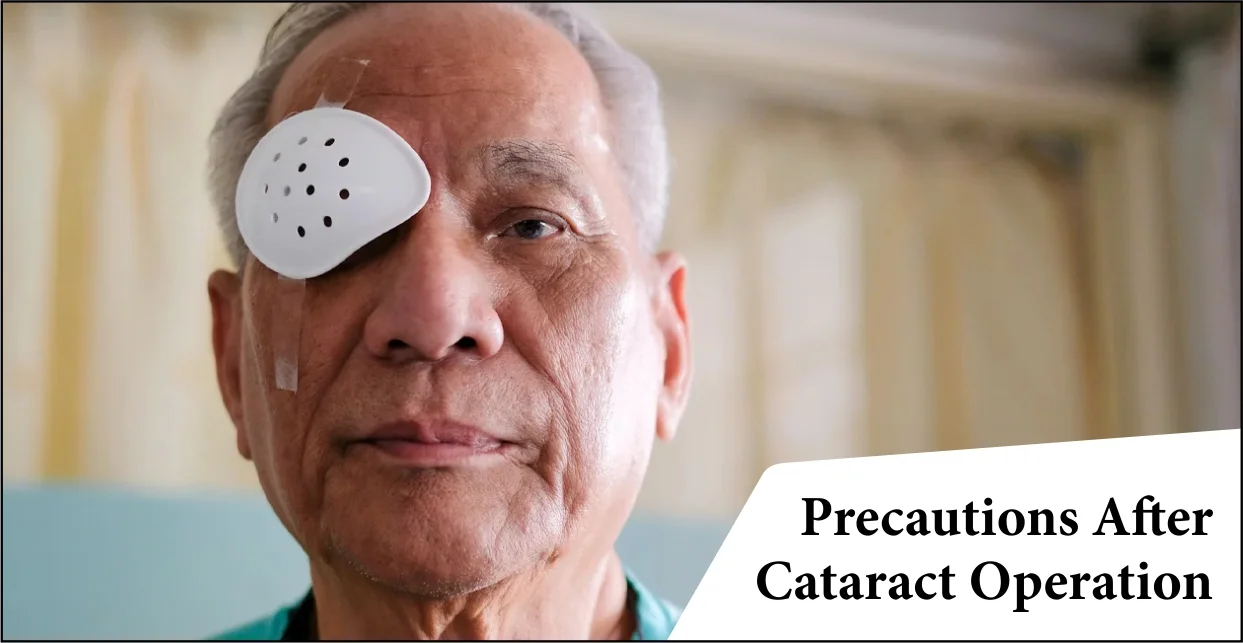Now that you’ve had cataract surgery, or you may be considering it, you undoubtedly want to know what comes next and what vital safety measures need to be followed following the procedure. Put an end to your continuous worries since you’ve come to the correct spot. Our skilled staff at Eye-Q Super Speciality Eye Hospital provides thorough post-operative advice and assistance to guarantee a speedy recovery and the best possible outcomes.
In this article, we’ll go over every crucial safety measure to take following a cataract surgery in india to make sure your recuperation goes well and your eyesight improves significantly. Let’s take a brief look at what cataract surgery is and the significance of post-cataract surgery precautions before we get started.
One of the easiest and most popular medical treatments used to treat cataracts, which are caused by the natural lens of the eye becoming clouded, is cataract surgery. Low light vision may be a challenge when dealing with cataracts as they can produce fuzzy vision. The clouded natural lens is removed during surgery, and an artificial intraocular lens (IOL) is put in its stead.
Even though the process appears simple, following cataract surgery, safety measures are essential for a full recovery. They lessen inflammation, guarantee appropriate healing, and guard against infections. We’ve included a list of essential preventative steps below that can help you protect your eye, reduce problems, and improve visual results.
Vital Precautions After Cataract Surgery
Comply With Prescription Instructions
Your doctor will recommend eye drops or other treatments to minimize inflammation, improve healing, and prevent infection as one of the most important post-cataract measures. You must follow the instructions carefully. As directed, apply the eye drops carefully and on time. If you happen to miss a dosage of eye drops, don’t panic; just make sure you remember the next time.
Prevent Infections In Your Eyes
One of the most crucial post-cataract surgery precautions is to keep your eyes out of polluted water to prevent infections. Avoid contact with pets at home or children under 5 year old for 2 weeks. This applies to hot tubs, swimming pools, and even showering with tap water. Wearing protective eyewear outside and during activities that might expose your eyes to particles is another way to help keep dust, debris, and other possible irritants out of your eyes.
Refrain From Touching Your Eyes
It’s critical to protect your eyes from the spread of infectious agents by not touching or scratching them. Do not rub or apply pressure to the eye. This may raise the possibility of infection or consequences by introducing dangerous germs or irritants. Gently blot or wipe the area surrounding your eye with a clean cloth to prevent irritation or itching. Alternatively, use Evolve wet wipes (for eyes only) or Pristine Lid Wipes (preservative free).
Wear Sunglasses
When you are outside, protect your eyes from UV radiation by using dark sunglasses with UV protection. This can shield your eyes from light as they recover and lessen sensitivity to it.
Reduce Your Exposure to Bright Light
Bright interior lighting can also be painful after surgery since it increases your sensitivity to light. However, take notice that intraocular lenses with UV filters included are installed during cataract surgery. Thus, your eyes are not harmed by the intense light. Until your eyes become used to the light, you might also want to think about using lower lighting or wearing sunglasses indoors.
Keep Exercise Light
Light exercise, like walking and aerobics, is not restricted, but you should stay away from intense activities, such as heavy lifting and exercise, since they can raise blood pressure, delay the recovery process, and raise the risk of problems.
Put On Eye Shields
Wearing an eye cover at night or during a nap is another precaution your surgeon could advise following a cataract procedure to screen your eyes from pressure or rubbing accidents. Observe the guidelines they provide on the usage of the shield. These shields facilitate a simple and rapid healing process by adding an extra layer of safety during the initial stages of recovery.
Keep An Eye Out For Cautionary Indicators
Among the safest procedures performed on the eyes is cataract surgery. But it’s critical to recognise any warning signals that can point to a problem. Talk to your surgeon right away if you have any strange symptoms, increasing redness, intense discomfort, sudden loss of vision, or profuse discharge. More serious concerns can be avoided by giving these issues prompt attention and taking urgent action.
Attend Follow-Up Appointments
To keep an eye on your development and handle any issues or difficulties, your surgeon will arrange for a few appointments. You have to take care of them, let them know if you’re uncomfortable or if your eyesight changes. Getting regular checkups will guarantee that any possible problems may be swiftly treated and that your eyes are recovering as predicted. You are at liberty to shift to your electronic screens whenever it suits you.
Be Patient
Following cataract surgery, recovery often takes a few days or hours, so it’s important to have patience during this time. Following surgery, visual results might not be at their finest right once, but they will become better with time. But in certain situations, such as advanced age, fragile corneas, difficult cataracts, or complex cataracts, it may take some time. It can take a few weeks for the advantages of the operation to become completely apparent to you and for your eyesight to stabilize.
Your Eyes Deserve The Finest!
By selecting Eye-Q Super Speciality Eye Hospital in india for your cataract surgery, you may be guaranteed that the skilled surgeons caring for your eyes will be operating on you. Eye-Q Super Speciality Eye Hospital is available to assist you with post-operative treatment as well as basic eye health guidance. You can rely on us to put your eyesight and health first. Make an appointment now to take advantage of Eye-Q Super Speciality Eye Hospital’s unmatched treatment.
Don’ts Post Cataract Surgery Care
Besides precautions after cataract surgery in India, there are some don’ts or restrictions that patients must adhere to ensure safety and better outcomes.
Avoid Rubbing or Touching Your Eyes
Do not even try to gently rub your eyes. It can irritate the surgical site or dislodge the healing incision. In case there is any discomfort or itching, use your prescribed eye drops rather than touching the eye.
Stay Away from Dusty or Polluted Environments
The particles of dust, smoke, and pollution can cause eye infection or delay healing. Therefore, it is recommended to at least try to stay indoors for the first few days after eye operation. In addition, always wear protective sunglasses when stepping outside.
Avoid Strenuous Activities or Exercise
This is another essential post-cataract surgery care practice patients must not ignore. Performing activities like gym workouts, running, or heavy lifting can increase eye pressure and may affect recovery. Rest properly and allow your eyes to heal before resuming physical activity. Resume them after discussing with your doctor.
Don’t Skip Prescribed Medications or Eye Drops
Using prescribed drops is critical to prevent infection and reduce inflammation. The skipping of these doses can lead to complications. So, strictly follow the dosage and timing recommended by your ophthalmologist.
Refrain from Swimming or Using Hot Tubs
Bathing in pools and hot tubs contains bacteria that can easily infect your eyes. Therefore, it is advisable to avoid swimming for at least 3–4 weeks after an eye operation. You must wait until your doctor advises.
Avoid Using Eye Makeup or Contact Lenses
Do not wear eye makeup; its particles can irritate healing tissues. And wearing contact lenses may interfere with recovery. Wait at least 2–3 weeks before resuming these, as per your doctor’s recommendation.
Don’t Drive Immediately After Surgery
There is a chance that your vision may be blurry or sensitive to light for a few days. Therefore, you must avoid driving until your doctor confirms your eyesight is stable and safe for the road.
Hygiene and Eye Care Tips After Cataract Surgery
Immediately after the cataract surgery, it is crucial to follow proper eye care and hygiene. This ensures smooth recovery and prevention against infection. Here are some essential tips:
1. Keep Your Eye Clean
- Do not touch your eye with dirty hands. Always keep them washed thoroughly.
- Do not rub or press the operated eye. Even if it feels itchy.
- Only use the cleaning solutions prescribed by your ophthalmologist.
2. Use Prescribed Medications Properly
- Use eye drops exactly as instructed and at the correct times.
- Properly follow the dosages and frequency advised for the antibiotic, anti-inflammatory, and lubricating drops.
- Do not ever share eye medications with others.
3. Avoid Contaminants
- Keep yourself away from dust, smoke, or polluted environments. It is even more important during the first week.
- You must avoid swimming pools, hot tubs, or saunas. Or at least wait until your doctor clears you.
- Avoid wearing eye makeup for at least 1–2 weeks to prevent irritation.
4. Protect Your Eyes
- Always wear sunglasses when outdoors. It helps you protect from sunlight, wind, and dust.
- If needed, use an eye shield while sleeping for the first few nights. It helps you avoid accidental rubbing.
5. Monitor for Warning Signs
- Keep your eye on redness, unusual pain, blurred vision, or discharge.
- In case you notice any of these symptoms, contact your ophthalmologist immediately.
Conclusion
The amazing process of cataract surgery may greatly enhance your vision and way of life. Nonetheless, it is crucial to adhere to the previously listed post-cataract surgical measures to guarantee a full recovery. You may anticipate a clearer, brighter future with better vision by taking medicines as directed, keeping pollutants out of your eyes, shielding your eyes from infections, and following your surgeon’s instructions. Throughout the healing process, don’t forget to prioritize your eye health and maintain regular interactions with your eye surgeon.
Frequently Asked Questions
1. What are the main precautions after cataract surgery in India?
The most common cataract eye surgery precautions include: avoid rubbing your eyes, swimming, or strenuous activity. Follow your doctor’s medication plan and attend follow-up visits for safe and quick healing.
2. How long do I need to follow cataract eye surgery precautions?
Most restrictions after cataract surgery last around 2 to 4 weeks. However, full recovery time varies depending on your age, healing speed, and doctor’s advice.
3. Can I watch TV or use my phone after the eye operation?
You can, but only in moderation. It is recommended to limit screen time for the first few days to prevent eye strain and dryness during post-cataract surgery care.
4. When can I wash my face after cataract surgery?
After 24-48 hours, you may gently wash your face. Avoid direct water contact with the operated eye. Always use a clean towel to pat dry.
5. Are there dietary restrictions after cataract surgery?
Well, there are no strict restrictions on diet. However, it is good to have a diet rich in vitamins A, C, and omega-3s. They support faster recovery and better eye health post-surgery.
6. When can I resume driving after a cataract operation?
Patients must avoid driving for at least 3–5 days after an eye operation. Or at least wait until your ophthalmologist confirms your vision is stable and clear enough for safety.
7. Is it normal to have blurry vision after cataract surgery?
Yes. It is normal to experience mild blurriness during the first few days of recovery. It usually improves as your eye adjusts and healing progresses.
8. How soon can I go outside after cataract eye surgery?
You can step out after 2–3 days by wearing sunglasses. Avoid crowded or dusty places as part of your post-cataract surgery care routine.
9. What is the cataract surgery recovery time?
The cataract surgery recovery time is generally minimal. However, the complete healing may take time. Most patients report improved vision within a few days. Moreover, the full recovery of vision may take 3 to 10 weeks. By this time, the eye gradually heals and vision stabilizes. Moreover, it is recommended to follow your doctor’s post-operative instructions. Eventually, this ensures a smooth and safe recovery.
10. How long to wear sunglasses after cataract surgery?
By wearing sunglasses, you can protect your eyes from UV rays, bright light, and dust particles. It is recommended to wear sunglasses whenever going outdoors. It is even more important in the first 1–2 weeks after surgery. Even wearing sunglasses can continue to protect your eyes and reduce strain in bright conditions.
11. How many days rest after cataract surgery?
A minimum of 2-3 days of rest is required after cataract surgery. Most patients can resume light daily activities the very next day. However, it is advisable to avoid strenuous activities like heavy lifting, bending, or exercise during the first week. Your surgeon will guide you on when it is safe to gradually return to normal routines.
12. How long to wear an eye patch after cataract surgery?
An eye patch or protective shield is usually worn right after the surgery. It is critical to prevent accidental rubbing and injury. In most cases, the surgeon suggests patients wear it for the first 24 hours. In some cases, your ophthalmologist will even suggest that you sleep with your eye open for the next few days to ensure the operated eye heals safely without disturbance.
13. When to Contact Your Doctor After Cataract Surgery?
You must immediately consult your doctor in case you notice any of these issues:
- In case there is a sudden vision change, such as blurred vision, flashes, or loss of vision.
- In case there is severe pain or pressure in the eye.
- If there is redness, swelling, or discharge that is worsening with time.
- In case there are any other unusual symptoms, like fever, nausea, or discomfort.




